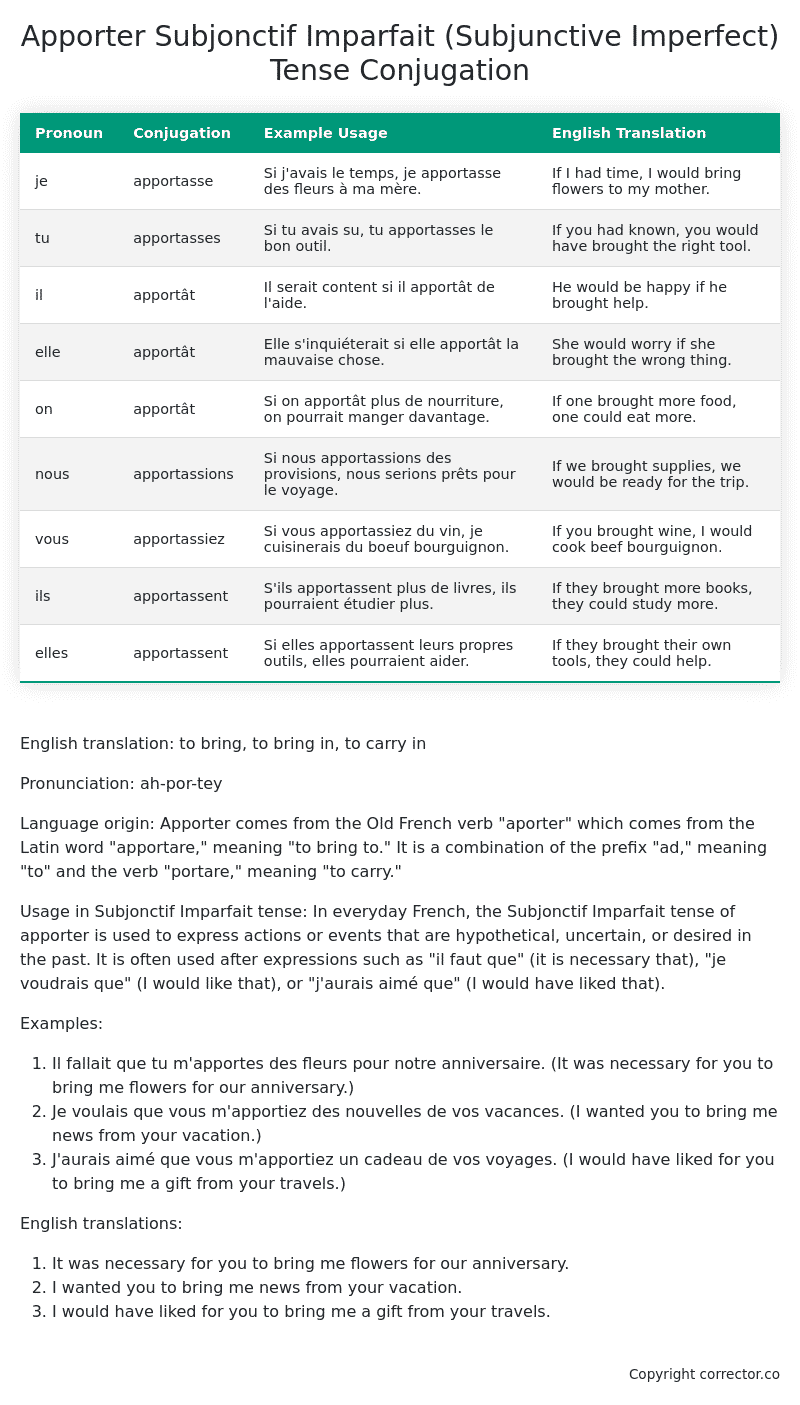Subjonctif Imparfait (Subjunctive Imperfect) Tense Conjugation of the French Verb apporter
Introduction to the verb apporter
English translation: to bring, to bring in, to carry in
Pronunciation: ah-por-tey
Language origin: Apporter comes from the Old French verb “aporter” which comes from the Latin word “apportare,” meaning “to bring to.” It is a combination of the prefix “ad,” meaning “to” and the verb “portare,” meaning “to carry.”
Usage in Subjonctif Imparfait tense: In everyday French, the Subjonctif Imparfait tense of apporter is used to express actions or events that are hypothetical, uncertain, or desired in the past. It is often used after expressions such as “il faut que” (it is necessary that), “je voudrais que” (I would like that), or “j’aurais aimé que” (I would have liked that).
Examples:
- Il fallait que tu m’apportes des fleurs pour notre anniversaire. (It was necessary for you to bring me flowers for our anniversary.)
- Je voulais que vous m’apportiez des nouvelles de vos vacances. (I wanted you to bring me news from your vacation.)
- J’aurais aimé que vous m’apportiez un cadeau de vos voyages. (I would have liked for you to bring me a gift from your travels.)
English translations:
- It was necessary for you to bring me flowers for our anniversary.
- I wanted you to bring me news from your vacation.
- I would have liked for you to bring me a gift from your travels.
Table of the Subjonctif Imparfait (Subjunctive Imperfect) Tense Conjugation of apporter
| Pronoun | Conjugation | Example Usage | English Translation |
|---|---|---|---|
| je | apportasse | Si j’avais le temps, je apportasse des fleurs à ma mère. | If I had time, I would bring flowers to my mother. |
| tu | apportasses | Si tu avais su, tu apportasses le bon outil. | If you had known, you would have brought the right tool. |
| il | apportât | Il serait content si il apportât de l’aide. | He would be happy if he brought help. |
| elle | apportât | Elle s’inquiéterait si elle apportât la mauvaise chose. | She would worry if she brought the wrong thing. |
| on | apportât | Si on apportât plus de nourriture, on pourrait manger davantage. | If one brought more food, one could eat more. |
| nous | apportassions | Si nous apportassions des provisions, nous serions prêts pour le voyage. | If we brought supplies, we would be ready for the trip. |
| vous | apportassiez | Si vous apportassiez du vin, je cuisinerais du boeuf bourguignon. | If you brought wine, I would cook beef bourguignon. |
| ils | apportassent | S’ils apportassent plus de livres, ils pourraient étudier plus. | If they brought more books, they could study more. |
| elles | apportassent | Si elles apportassent leurs propres outils, elles pourraient aider. | If they brought their own tools, they could help. |
Other Conjugations for Apporter.
Le Present (Present Tense) Conjugation of the French Verb apporter
Imparfait (Imperfect) Tense Conjugation of the French Verb apporter
Passé Simple (Simple Past) Tense Conjugation of the French Verb apporter
Passé Composé (Present Perfect) Tense Conjugation of the French Verb apporter
Futur Simple (Simple Future) Tense Conjugation of the French Verb apporter
Futur Proche (Near Future) Tense Conjugation of the French Verb apporter
Plus-que-parfait (Pluperfect) Tense Conjugation of the French Verb apporter
Passé Antérieur (Past Anterior) Tense Conjugation of the French Verb apporter
Futur Antérieur (Future Anterior) Tense Conjugation of the French Verb apporter
Subjonctif Présent (Subjunctive Present) Tense Conjugation of the French Verb apporter
Subjonctif Passé (Subjunctive Past) Tense Conjugation of the French Verb apporter
Subjonctif Imparfait (Subjunctive Imperfect) Tense Conjugation of the French Verb apporter (this article)
Subjonctif Plus-que-parfait (Subjunctive Pluperfect) Tense Conjugation of the French Verb apporter
Conditionnel Présent (Conditional Present) Tense Conjugation of the French Verb apporter
Conditionnel Passé (Conditional Past) Tense Conjugation of the French Verb apporter
L’impératif Présent (Imperative Present) Tense Conjugation of the French Verb apporter
L’infinitif Présent (Infinitive Present) Tense Conjugation of the French Verb apporter
Struggling with French verbs or the language in general? Why not use our free French Grammar Checker – no registration required!
Get a FREE Download Study Sheet of this Conjugation 🔥
Simply right click the image below, click “save image” and get your free reference for the apporter Subjonctif Imparfait tense conjugation!

Apporter – About the French Subjonctif Imparfait (Subjunctive Imperfect) Tense
Formation
Common Everyday Usage Patterns
Interactions with Other Tenses
Subjonctif Présent
Indicatif Passé Composé
Conditional
Conditional Perfect
Summary
I hope you enjoyed this article on the verb apporter. Still in a learning mood? Check out another TOTALLY random French verb conjugation!


